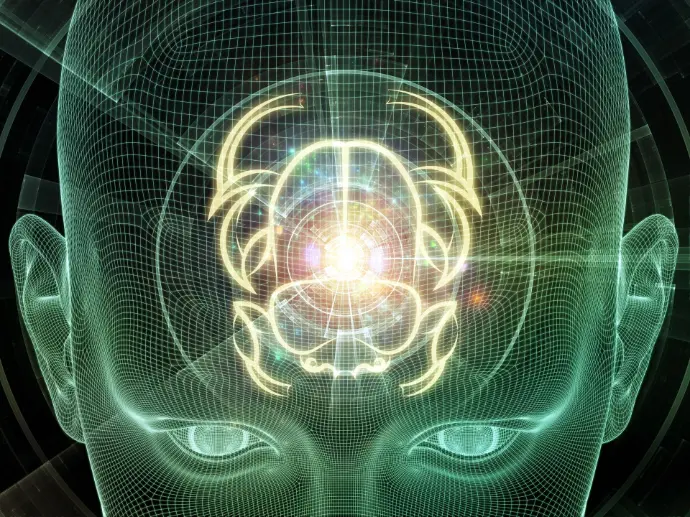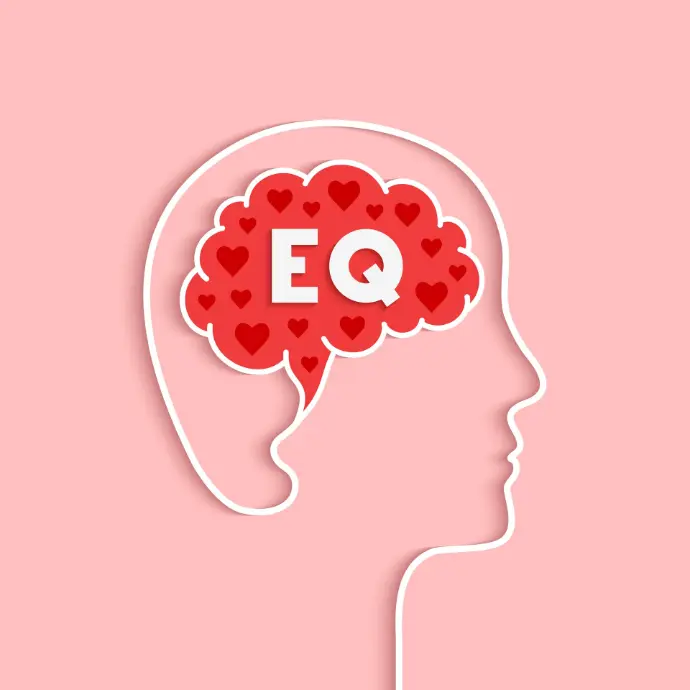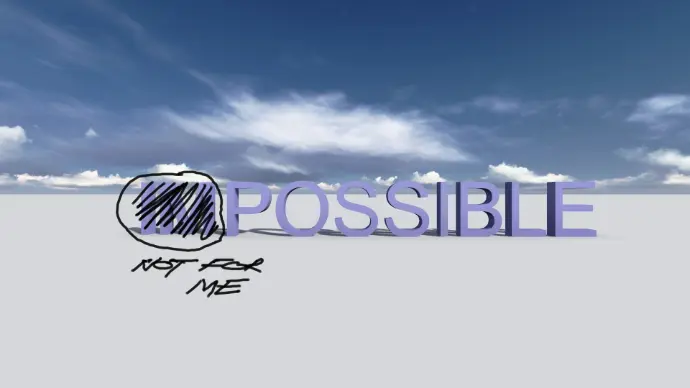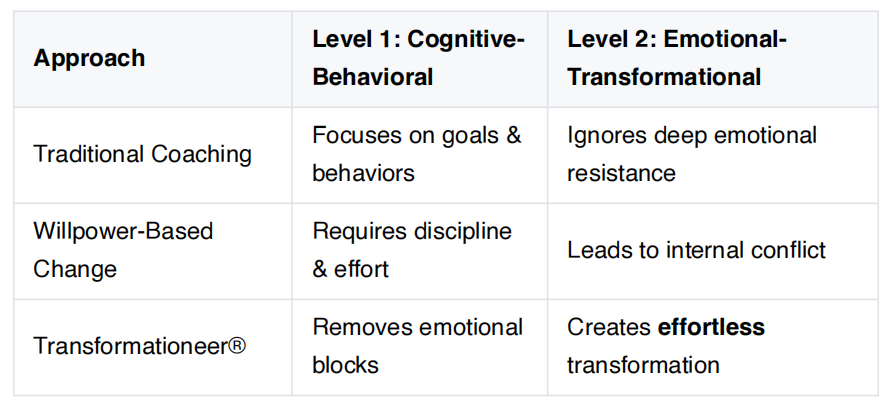Unlocking the Power of Transformation: The Science and Philosophy Behind Transformationeer®
Why Change Feels So Hard (And Why It Doesn’t Have to Be)
If you’ve ever tried to change a habit, master a new skill, or overcome emotional roadblocks, you’ve likely encountered frustration. You know what you should do, but something inside resists. You push harder, but willpower isn’t enough. You fall back into old patterns and wonder: Why is change so difficult?
This struggle isn’t a failure of motivation. It’s a misunderstanding of how deep transformation works.
Most personal growth programs rely on surface-level solutions: behavior modification, habit stacking, or mindset shifts. But these approaches often ignore the deeper layers of human psychology—the emotional barriers, unconscious patterns, and unresolved experiences that dictate our actions.
The Transformationeer® Framework offers a radically different approach. Instead of forcing change, it removes the hidden obstacles that make change feel hard. The result? Transformation happens naturally and effortlessly.
This article explores the science, psychology, and philosophy behind this revolutionary method—drawing from neuroscience, trauma research, existential philosophy, and behavioral psychology—to show why Transformationeer® is the most effective way to create lasting change.
The Hidden Force That Shapes Your Life: Unresolved Emotional Barriers
Most people believe their actions stem from conscious decision-making. But in reality, our behavior is largely driven by unconscious emotional patterns formed throughout our lives. These patterns act as hidden scripts, shaping our reactions, decisions, and even our sense of self.
Consider these examples: - A high-achiever who can’t stop working but never feels satisfied. - A leader who struggles with impostor syndrome despite overwhelming success. - A person who wants deep relationships but consistently sabotages them.
These aren’t logical problems; they’re emotional patterns running in the background, often rooted in childhood experiences, trauma, or social conditioning. Trying to force change without addressing these deeper layers is like rearranging furniture on the Titanic—it doesn’t solve the underlying issue.
The Science Behind Emotional Programming
Modern neuroscience and trauma research validate what ancient philosophies have long understood: emotions and past experiences create neural pathways that dictate behavior.

Neuroscience & Habit Formation: The brain prioritizes efficiency, meaning repeated behaviors become hardwired in the basal ganglia (the habit center of the brain). If an emotional response is linked to a behavior (e.g., stress triggering workaholism), it becomes deeply ingrained.

Polyvagal Theory: Developed by Dr. Stephen Porges, this theory explains how the nervous system regulates emotions and responses to stress. Unresolved emotional trauma keeps the body in a fight-or-flight state, making deep change impossible until these responses are regulated.

Cognitive & Emotional Processing: Traditional behavioral coaching focuses on cognitive shifts, but real change happens in the emotional and physiological system. Emotional clarity leads to effortless transformation —without force or discipline.
Transformationeer® works at this level. Instead of trying to override these patterns with sheer willpower, it identifies and dissolves the root cause of resistance—unlocking effortless growth and change.
The Myth of Willpower: Why Force-Based Change Fails

The self-help industry often promotes discipline, willpower, and habit stacking as the keys to success. But research in behavioral psychology and neuroscience shows that forcing change is unsustainable.
Why Willpower Doesn’t Work Long-Term
1. It’s Exhaustible – Willpower functions like a muscle; it depletes throughout the day (Baumeister’s ego depletion theory).
2. It Ignores Emotions – Change isn’t just about logic; emotional resistance often overrides rational plans.
3. It Creates Inner Conflict – Trying to ‘force’ yourself into a behavior leads to internal rebellion and stress.
Example: A leader wants to become less reactive under stress. They try mindfulness, deep breathing, and affirmations—but still explode under pressure. Why? Because the reaction isn’t a conscious choice; it’s a deeply ingrained nervous system response.
Transformationeer® doesn’t use willpower. It removes the emotional charge behind unwanted behaviors, so change happens effortlessly—without resistance.
The Philosophical Foundation of Transformationeer®
Transformationeer® aligns with existentialist, humanist, and pragmatic philosophies, emphasizing:

- Self-Determined Meaning – Unlike traditional coaching that imposes goals, Transformationeer® helps clients uncover their intrinsic drivers.

- Freedom from False Narratives – People live within cognitive distortions that limit growth. By exposing and dissolving these, Transformationeer® creates radical clarity.

- Effortless Change – The Taoist concept of Wu Wei (flow) states that the best action is action without resistance. Transformationeer® achieves this by resolving deep-rooted emotional resistance.
Why Traditional Personal Growth Misses the Mark
Traditional self-help approaches operate at Level 1 (cognitive-behavioral), missing the deeper Level 2 (emotional and unconscious processing).

Transformationeer® goes deeper than mindset coaching, unlocking real transformation at the source.
The Transformationeer® Method: How It Works
Transformationeer® is not a theory—it’s a structured system that creates real change through:
1. Emotional Clarity – Identifying and resolving unconscious resistance.
2. Neural Rewiring – Using neuroscience-based methods to shift emotional responses.
3. Effortless Integration – Once barriers are gone, behavior shifts naturally.
Real-World Example
A CEO suffering from chronic stress and burnout had tried everything— meditation, therapy, time management. Nothing worked. Within weeks of Transformationeer®, their stress naturally dissolved because the emotional patterns creating the stress response were cleared.
No force. No discipline. Just clarity and effortless change.
Who Is Transformationeer® For?
Transformationeer® is for high-performers, leaders, and innovators who: - Struggle with self-sabotage or repeating patterns. - Want real transformation without force or discipline. - Have tried traditional coaching but want something deeper.
If you resonate with this, Transformationeer® is designed for you.
Your Next Step: Experience Effortless Transformation
Are you ready to stop forcing change and start experiencing effortless transformation?
Book a Consultation
Discover how Transformationeer® can unlock your highest potential—without discipline, without force, and without struggle.
Or explore how this framework can be applied to your team, organization, or personal growth journey
Change doesn’t have to be hard. Transformationeer® makes it effortless.

